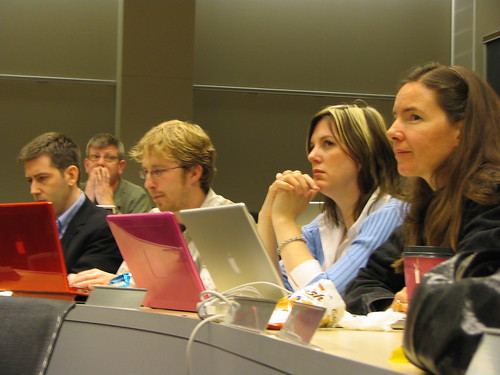[en] Live notes of a talk on marketing at BarCamp Lausanne.
mes notes, avec toutes les imperfections d’usage.
Sandrine se retrouve souvent à l’interface entre le monde de la technologie et celui du marketing et la communication.
“Le marketing, c’est comme la soupe: on aime pas forcément toujours, mais faut en manger quand même.”
Le marketing c’est indispensable, et comme la communication, on le fait déjà naturellement, sans s’en rendre compte. Une question de vocabulaire.
Situation type: “j’ai fait un super truc, mais je sais pas pourquoi, ça prend pas” — en général, symptôme d’un manque côté marketing/communication.
Soucis courants quand on lance un projet:
3 aspects principaux d’un projet:
- savoir-faire (technique, management)
- faire savoir (se mettre en valeur, expliquer, faire qu’on en parle — communication, quoi)
- ressources (finances)
Ce qui fera la différence (pour le deuxième point):
- branding: être concis dans l’explication du but du projet. Les gens ont une mémoire de poisson rouge, et pour qu’ils retiennent les choses, il faut les percuter, en s’adressant à leurs émotions. Donc, y accrocher des valeurs. Choisir un nom court, facile, et transportable pour qu’il soit viral. steph-note: à mon avis, avant de s’intéresser au nom, il faut avoir quelque chose derrière — c’est beaucoup plus important que le nom ou le branding.
- l’usage, pas le technique: c’est pas les fonctionnalités qui importent, c’est ce que les gens vont en faire.
- mettre en avant ce qui vous rend spécial: qu’est-ce qui vous différencie des autres? Y rendre les gens attentifs. steph-note: marketing 101.
- créer un comité de soutien: les outils pour faire ça aujourd’hui sont colossaux. Créer une communauté. Il faut chercher à la créer, l’entretenir, s’assurer qu’elle a son comptant d’informations (?). Tenir les autres au courant de ce qu’on fait. Y’a jamais d’overdose de communication, on ne communique jamais trop. steph-note: pas d’accord. Il n’y a que de la mauvaise communication.
- rendre ce qui est complexe, simple: ce qu’on fait doit améliorer les choses; rendre la technique élégante. Simplifier au niveau de la communication.
- parler 1 fois, écouter 2: dans la communication, l’élément le plus important c’est l’interactivité. Règles en communication: être pertinent, constant, progressif. Les gens se sentent très peu écoutés de nos jours. Etre à l’écoute, nous permet de récolter des argument très utiles pour la suite.
- impliquer les autres: à tous les stades du projet, demander toujours l’avis des gens. Plus les gens participent, plus ils seront confortés dans l’idée que ce qu’on fait est une bonne chose.
- être transparent: faire ce qu’on dit, dire ce qu’on fait. C’est pas toujours facile. Ex: Sandrine sur son blog, s’est retrouvée parfois à pas savoir comment dire une information.
- soigner ses supporters: très important. Il faut les bichonner sans arrêt (pas les soudoyer ou les corrompre, quand même). Si on réussit ce qu’on fait, c’est par eux que va passer la communication virale. Si ce qu’on fait est suffisamment mémorable et réussi, c’est eux qui en parleront aux autres. C’est pour ça que les messages courts sont importants. Ça rend plus facile pour les supporters de les transporter.
- faites ce que vous savez faire de mieux: ceci est très important, mais c’est un des dix points! Les points d’avant mettent ceci en valeur. En être convaincu soi-même. On sait ce qu’on sait faire, et ce qu’on ne sait pas faire. Faire que les gens soient conscients.
Discussion: Sandrine et moi sommes en désaccord avec l’importance du concept de “message”. Pour moi, les stratégies développées plus haut restent dans la même conception fatiguée de “marketing comme message”. Personne n’a envie d’écouter un “message”. Les relations priment sur le message. Oui, bien sûr, par mes actes, je communique des choses (“on ne peut pas ne pas communiquer”). Mais je crois personellement que pour “changer la façon dont nos projets sont perçus”, il faut dépasser cette notion de “message”. Quand je raconte ce que je fais dans mon projet sur mon blog, je ne suis pas en train de fabriquer un “message” (même inconsciemment), je suis en train de raconter une histoire. De parler en tant qu’être humain. Et ça c’est mille fois plus important que tout ce qu’on peut dire autour de “rendre un message viral”. cf. les notes de ma conférence sur les blogs en entreprise, où j’explique l’importance des constats du Cluetrain Manifesto. Pour moi, on est resté coincés (dans cette présentation) dans une conception “pré-Cluetrain” du marketing et de la communication. Il faut abandonner ce concept de “message” plutôt qu’essayer de le sauver à tout prix et de l’intégrer dans quelque chose où il n’a pas de place. On s’en portera bien mieux. Et en plus j’ai faim.














